#kings temple choir
Text
youtube
He's A Friend - Benny Cummings Directs The Kings Temple Choir (NOW, 1977)
#Soul#Soul Music#Soul Music Songs#Music#Music Songs#1977#Gospel#Gospel Soul#Benny Cummings Directs The Kings Temple Choir#NOW#He's A Friend#Youtube
3 notes
·
View notes
Note
For the soft prompt meme: 28. forehead touches or nose nudging or any soft variation on the theme (for your choice of Sandman ship :) maybe Dream/Calliope if that strikes your interest)
Thank you! Never wrote these two before, but I'll take a crack at it!
--
While Calliope falls asleep in her husband's arms most nights, she usually wakes up alone. As the Dream King, Oneiros has no true need for sleep, and he prefers to be there when Orpheus rises. It's time that Calliope is happy to let them share without her interference.
This morning, she is greeted by sunlight filtering through the stained glass windows of their bedroom, and already she knows it will be a good day. There is an opening in the stone wall that was not there when she fell asleep, left especially for her to follow when she awoke. It is easy to find the path to the lush clearing where her son and husband play.
Little Orpheus's honey blonde curls bounce along with his uncontained delight. Oneiros has created a choir made up of all manner of creatures both mythical and natural, each assigned its own part to play. A cluster of crickets form the string section, song birds warble in place of woodwinds. Calliope even spots a porpoise at the back, standing on its tail fin as if it were its hind legs, clicking along in time to the song Orpheus improvises.
He is so absorbed in pointing at different creatures in turn, cuing them, demanding they play louder, faster, that Orpheus does not notice his mother approaching. The sound of his laughter carries over the music he creates in tune with these creatures conjured from dreamstuff.
Oneiros sits on the bank a few feet away, watching their son and choirmaster. His cloak, royal blue and glittering with stars, fans out on the downy grass behind him. While most would not recognize his expression as enraptured, Calliope sees it plain as the blossoming tree branches hanging above them.
She sits quietly beside her husband, not wanting to interrupt their son's latest cantata. The adoring look on Oneiros's face remains unchanged as he turns it on her. It should be impossible that she could make him as happy as their son, the light of both their lives, does. But by now, she knows better than to question these small pockets of happiness. Eternity is a long time, and only a small fraction of it holds moments as joyful as this.
She leans into Oneiros, nuzzling at the smooth skin on the side of his neck. He welcomes her into the crook of his arm, pressing his cool lips gently against her temple. The air smells of blooming jasmine, the cloak he slings over her mostly bare back is like a patch of shade shielding her from a warm morning that will intensify into a hot summer day. She closes her eyes, breathes it all in, and knows nothing but music and love.
—
This piece was brought to you by these Soft Prompts. My inbox is open if anyone wants to hop in with asks for Sandman, The Magnus Archives, or Malevolent ships (or any of my OCs)!
#the sandman#dreamuse#calliope x dream#calliope the sandman#dream of the endless#oneiros#morpheus the sandman#soft prompts#Kick's fics
86 notes
·
View notes
Text

There are three hierarchies of angels each of which contains three orders.
The Nine Choirs of Angels
The Arrangement of the Angels of the Lord (according to Pseudo-Dionysius)
Let’s turn to the individual choirs so that we can examine the powers each have, and how they relate with one another.
Seraphim
The seraphim are the angels closest to God. As such, they reflect most immediately the highest attribute of God manifest in creation: His love. They are on fire with the love of God; the very name means “incandescent ones” or “burning ones.” Classical sacred art portrays them as entirely red and ablaze. They are usually depicted as having six wings but no faces — simply a sea or ring of flame around the Holy Trinity. Because of this burning love, more than any other angel they have the most perfect knowledge of God, which makes them the most perfect adorers. St. Jerome notes that they not only burn by themselves, but they also inflame others with the love of God.
According to the prophet Isaiah, the seraphim are the angels whom he hears crying out “Holy, holy, holy,” as one of them purifies Isaiah’s mouth with a coal from the altar so that he might serve as the Lord’s messenger (Isa. 6:3–8). In the Extraordinary Form of the Roman Mass, the priest evokes this moment as he prays for worthiness in proclaiming the Gospel. We too should pray to the seraphim that we might be purified in our responsibilities as teachers and bearers of the Word to our families, our friends, and all those over whom we have responsibility. It was a seraph who appeared to St. Francis of Assisi when he received the stigmata. Later mystics, too, will speak of the seraphim as the Lord’s messengers and intermediaries when they had extraordinary experiences of loving and transforming divine union.
Cherubim
The cherubim have a deep intellectual knowledge of divine secrets and of the ultimate causes of things; their name means “all-knowing one.” As such, they constantly contemplate the wisdom and the love of God in His relationship with mankind. They reflect His omniscience. The cherubim were the mighty adorers of the first covenant in its wisdom; images of the cherubim were the only images of beings that were permitted in the ancient Temple of Jerusalem. Their carved figures adorned the lid of the Ark of the Covenant, which prefigured both the Virgin Mary “tabernacling” the unborn Christ and the Eucharistic tabernacles of our churches, containing the new manna of Christ’s sacramental Body and Blood. Embroideries of the cherubim also covered the beautiful drapery that separated the Holy of Holies from the outer court of the Temple. It was that veil that was ripped from top to bottom when Our Lord died on the Cross as the sign that He had passed into the Eternal Sanctuary and that the Temple of Jerusalem had fulfilled its purpose (Matt. 27:51). The cherubim are still considered protectors of the New Covenant and so are often depicted on tabernacles and Eucharistic vessels.
Thrones
The thrones, as their name suggests, can be thought of as beings raised up to form the seat of God’s authority and mercy. A throne manifests the glory and authority of a king; it expresses stability and power. And since a throne is also a judgment seat, these angels are especially concerned with divine judgments and ordinances.
In the early Church, a common representation of God’s glory in Heaven was a mosaic behind the altar and above the seat of the bishop that represented an empty throne with a radiant cross mounted above it. This image represented Christ the King, Lord of all and Judge of the living and the dead. But His judgment seat was also a throne of mercy, for Christ has redeemed the world by His Cross. His love has brought us to salvation. The thrones are never seen or experienced as “flying” but as “rolling” across the heavens, in keeping with their manifesting the Lord’s stability.
* * *
The second hierarchy receives knowledge of divine secrets through the first three choirs — knowledge that they could not perceive by themselves. The ardor of the seraphim inflames their love; the wisdom of the cherubim reveals the depth of the mysteries; and the stability of the thrones draws them into constant adoration of God’s majesty. In the Summa Theologiae, St. Thomas teaches that the names “domination,” “power,” and “principality” belong to government in different ways. The place of a lord is to prescribe what is to be done, and so Gregory says that “some companies of the angels, because others are subject to obedience to them, are called dominations.”
Dominations
The dominations are concerned with the government of the universe. They are the first of the three choirs in the second ring, which is the ring of the cosmos — the angels who are charged with great and universal stewardships. The dominations in particular are involved in the workings of divine power. They coordinate the ministries of all the angels who deal with creation. We see in the angelic world that the Church’s teaching that God works through secondary causes is beautifully demonstrated. The angels mediate God’s power just as the saints intercede for us with Him.
Virtues
St. Peter mentions the virtues in his first epistle (3:22), as does St. Paul in his Letter to the Colossians (1:16). The name is in some way a mistranslation or at least a “false cognate,” since this choir of angels does not deal with acquired habits (virtues), but rather exercises innate, raw power over the physical universe. According to Pseudo-Dionysius, their name refers to “a certain powerful and unshakable virility welling forth into all their Godlike energies, . . . mounting upwards in fullness of power to an assimilation with God; never falling away from the divine life through its own weakness, but ascending unwaveringly to the super-essential Virtue which is the Source of virtue.”1 They are the lords of causality and the principles of cosmic order in the material realm. They ensure the well-being of the world.
Powers
The powers (dunameis) form the third and last choir of the second angelic hierarchy, according to Pseudo-Dionysius, while other scholars and spiritual writers consider them to be the fifth choir. This choir is mentioned occasionally in the Old Testament, such as in the book of Daniel where we read, “Bless the Lord, all powers, sing praise to him and highly exalt him for ever” (Dan. 3:39). Some scholars maintain that the name “powers” is also used to indicate angels in general, since it is the Septuagint’s translation of the Hebrew sabaoth. In the New Testament St. Paul writes that there are powers who have remained faithful to God and powers who have fallen away and become part of the empire of Satan (Eph. 6:12). The choir of powers is thought to introduce man to the higher mysteries while repressing the attacks of the “hostile powers” of Hell against the deepest laws of physical creation.
* * *
The third sphere of angels is concerned with Almighty God’s plan of salvation for mankind. It receives from the highest sphere its focus on the immutability of God, which is manifested in creation by the harmonious principles and intelligent organization of the laws of nature, which are upheld by the angels of the second sphere. In turn, the angels of this third sphere pour out their influence on those who have the greatest interaction with us in the ordinary course of things established by God.
Princes or Principalities
The princes are also described as having members who have fallen away and others who have remained faithful. Principalities are the leading choir of the last hierarchy of angels. Their activities are described by Pseudo-Dionysius in this way, “The name of the Celestial Principalities signifies their Godlike princeliness and authoritativeness in an Order which is holy and most fitting to the princely Powers.” They are often seen as being the guardians of nations or peoples; this is why St. Michael is described in the book of Daniel as “the prince of Israel,” who comes to the aid of Gabriel against the demonic prince of Persia. It seems fitting that this first choir in the “ring of salvation” should also look after the spiritual structure of the supernatural life of the Church.
Archangels
This choir is the most known and loved in popular devotion. Among the archangels we find St. Michael, St. Gabriel, and St. Raphael. It is traditionally believed, due to the statements of Raphael in the book of Tobit, that there are only seven archangels.
Three of their names occur in Scripture, and so the Church uses these names in our worship — St. Michael, the prince of the heavenly host and the only one called “archangel” in the Scriptures; St. Gabriel, the messenger of the Incarnation; and St. Raphael, the angel of healing and of medicine.
The names of the other four are not used in our Liturgy, though there are certain churches that preserve these names and make use of them in private devotion, including some Eastern Catholic Churches. Roman Catholics often refer to them as the seven archangels or the seven assisting spirits around the throne of God.
The seven archangels have been regarded from the very beginning as having a special place in God’s plan; their number is often associated with the seven days of the week and the seven sacraments. It is thought that the archangels were outstanding in their fidelity to God, and so in the writings of the saints they are often called archangel princes, an appellation that connotes leadership and authority in the heavenly realm. Many spiritual authors and mystics speak of their special assistance and often attribute other “groups of seven” to their protection or patronage — virtues, gifts of the Holy Spirit, and so on. The archangels are also associated with the protection of nations, dioceses, religious communities, and the mission of the Church.
Angels
The ninth and final choir of angels is composed of those who are most involved with the doings of mankind. These angels are those who are sent out on missions from God and from whom the guardian angels are chosen. The angels who fill up this choir may be the lowest, but they are beloved because the Lord places them at our sides to watch over us and to care for us. They are the ministers of Christ’s love and our protectors. They defend us against harm and temptation. They warn us of impending evil and inspire us to remain faithful to God in prayer.
27 notes
·
View notes
Text

Nehemiah Dedicates the Wall
27 Now at the dedication of the wall of Jerusalem they sought out the Levites in all their places, to bring them to Jerusalem to celebrate the dedication with gladness, both with thanksgivings and singing, with cymbals and stringed instruments and harps. 28 And the sons of the singers gathered together from the countryside around Jerusalem, from the villages of the Netophathites, 29 from the house of Gilgal, and from the fields of Geba and Azmaveth; for the singers had built themselves villages all around Jerusalem. 30 Then the priests and Levites purified themselves, and purified the people, the gates, and the wall.
31 So I brought the leaders of Judah up on the wall, and appointed two large thanksgiving choirs. One went to the right hand on the wall toward the Refuse Gate. 32 After them went Hoshaiah and half of the leaders of Judah, 33 and Azariah, Ezra, Meshullam, 34 Judah, Benjamin, Shemaiah, Jeremiah, 35 and some of the priests’ sons with trumpets—Zechariah the son of Jonathan, the son of Shemaiah, the son of Mattaniah, the son of Michaiah, the son of Zaccur, the son of Asaph, 36 and his brethren, Shemaiah, Azarel, Milalai, Gilalai, Maai, Nethanel, Judah, and Hanani, with the musical instruments of David the man of God. And Ezra the scribe went before them. 37 By the Fountain Gate, in front of them, they went up the stairs of the City of David, on the stairway of the wall, beyond the house of David, as far as the Water Gate eastward.
38 The other thanksgiving choir went the opposite way, and I was behind them with half of the people on the wall, going past the Tower of the Ovens as far as the Broad Wall, 39 and above the Gate of Ephraim, above the Old Gate, above the Fish Gate, the Tower of Hananel, the Tower of the Hundred, as far as the Sheep Gate; and they stopped by the Gate of the Prison.
40 So the two thanksgiving choirs stood in the house of God, likewise I and the half of the rulers with me; 41 and the priests, Eliakim, Maaseiah, Minjamin, Michaiah, Elioenai, Zechariah, and Hananiah, with trumpets; 42 also Maaseiah, Shemaiah, Eleazar, Uzzi, Jehohanan, Malchijah, Elam, and Ezer. The singers sang loudly with Jezrahiah the director.
43 Also that day they offered great sacrifices, and rejoiced, for God had made them rejoice with great joy; the women and the children also rejoiced, so that the joy of Jerusalem was heard afar off.
Temple Responsibilities
44 And at the same time some were appointed over the rooms of the storehouse for the offerings, the firstfruits, and the tithes, to gather into them from the fields of the cities the portions specified by the Law for the priests and Levites; for Judah rejoiced over the priests and Levites who ministered. 45 Both the singers and the gatekeepers kept the charge of their God and the charge of the purification, according to the command of David and Solomon his son. 46 For in the days of David and Asaph of old there were chiefs of the singers, and songs of praise and thanksgiving to God. 47 In the days of Zerubbabel and in the days of Nehemiah all Israel gave the portions for the singers and the gatekeepers, a portion for each day. They also consecrated holy things for the Levites, and the Levites consecrated them for the children of Aaron.
— Nehemiah 12:27-47 | New King James Version (NKJV)
The Holy Bible; New King James Version®. Copyright © 1982 by Thomas Nelson. All rights reserved.
Cross References: Numbers 1:8; Numbers 18:21; Deuteronomy 18:8; Deuteronomy 20:5; 1 Kings 8:63; 2 Kings 7:10; 2 Kings 14:13; 1 Chronicles 6:40; 1 Chronicles 9:16; 1 Chronicles 9:33; 1 Chronicles 25:1; 2 Chronicles 8:14; 2 Chronicles 29:30; Ezra 3:11; Nehemiah 2:13-14; Nehemiah 13:4-5; Nehemiah 3:8; Nehemiah 3:11; Nehemiah 3:15; Nehemiah 3:26; Nehemiah 11:23; Nehemiah 13:10; Nehemiah 13:22; Nehemiah 13:30; Psalm 9:2; Psalm 92:4; Psalm 137:4; John 5:2
#Jerusalem#wall#dedication#service#Temple#provision#Nehemiah 12:27-47#Book of Nehemiah#Old Testament#NKJV#New King James Version Bible#Thomas Nelson
11 notes
·
View notes
Text
JCS 2000 ALBUM LISTENING (thoughts)
Disclaimer: the only Jesus Christ Superstar I've ever heard before this is the original concept album.
Heaven on their minds: wow, the mixing sucks. Also Judas' voice is odd, sounds a bit weak.
What's the buzz? Strange thing, mystifying: damn, Jesus has a soft voice. I think I kinda like it. Otherwise the track feels somehow hurried and odd paced.
Everything's alright: the mixing is so horrible it's almost making me a hater. Also, the way the singing is flowing with the music feels weird compared to the original concept album (not just on this song but the other's as well).
Hosanna: hmm, this one feels a bit more pleasant to listen to. Whoever plays Caiaphas sounds kinda bussing.
Simon Zealotes / Poor Jerusalem: even the instrumental is poorly mixed. I like the choir singing. Simon has a nice voice too. As far, I feel like they casted the main trio (Jesus, Judas, Mary) a bit poorly but the rest quite well. The mixing is too “cinematic” aka some bits are just too silent.
Pilate's dream: too fucking silent. Singer sounds like mom said that we have opera at home.
The temple: this has some of my favourite lines for Jesus. It was very promising until we got there. Jesus wasn't upset enough. Should've screamed more angrily. (Oh boy, what will Gethsemane be with this…) Also, the end part of the song began too quietly once again, but it got better. Seriously, Jesus’ singer lacks aggression. He is great but it's lacking.
I don't know how to love him: honestly, at this point I'm probably just a hater, but they played it too safe with Mary.
Damn, they just skipped songs??? Where's Damned for all time / Blood money??? (This made me realise that there's songs missing from the beginning as well.)
The last supper: was the original this long as well? This feels oddly long. The Jesus & Judas argument is cool, except angry Jesus reminds me of the video where a man was screaming at yellow paint. Choir singing slaps though. Splendid.
Gethsemane: Oh no. The beginning is horrible. WHAT IS WRONG WITH THE PACING OF THE SINGING??????? I want to scream into a cardboard tube. The emotion is put in the wrong places. Sounds extremely hilarious. Man screams at yellow paint again. I feel like this was too pretentious and therefore failed to be the great masterpiece it should be.
King Herod's song: hell nahh what is this goofy ahh shit 💀💀💀 I never want to hear this again.
Could we start again, please?: What's this? I've never heard this song in my life. They decided to add this instead of the banger songs they cut out??? (Ok apparently this was in the og movie. I haven't seen it so I didn't know, but this track is lame.)
Judas’ death: promising start, nice amount of drama, but that's about it. The rest is meh. Honestly, I regret uninstalling subway surfers because this is boring.
Trial before Pilate: “so the king is once again my guest” but you cut out the part where he was his guest for the first time lol. I have to admit that Jesus’ vocals are pretty neat in this (rare). Also the mixing seems to have gotten a bit better as we're reaching the end, or maybe I've just gotten used to it…
Superstar: the intro goes hard. Vocals are surprisingly good for this album too.
Crucifixion: DJHSGSDHSHSGZ omg lollll what the fuck this is just so fucking miserable 😭
John nineteen: forty-one: it's an instrumental, they can't fuck it up, right?
I want back the 1 h 19 min I just wasted from my life.

#jesus christ superstar#jesus christ superstar 2000#jcs#andrew lloyd webber#tim rice#glenn carter#jerome pradon#jesus#judas#text
11 notes
·
View notes
Text
As promised my list (so far) of Toxic Obsessive Homoerotic Friendship book recs, part 1! This list is my top ten, from most favorite to not quite as favorite (but still awesome) according to my own taste. I wanted to include pictures but it was a nightmare. I will make part two as soon as I can! Please give me your recs if you have any :) A lot of these books have heavy topics so please look up trigger warnings!
1. Black Iris by Elliot Wake (formerly known as Leah Raeder and the book is under that name)
Laney, a fresh high school graduate, meets two older college students, a boy and a girl, and they form a friendship and have different dynamics between all three of them. At the same time, she’s still dealing with a boy who bullied her in high school.
2. If We Were Villains by M. L. Rio
In present day, Oliver is being released from prison after being convicted of a violent crime. In the past we visit him and his close group of friends as they study at a very prestigious and exclusive Shakespeare acting academy, and learn what really happened.
3. These Violent Delights by Micah Nemerever
Paul meets Julien in a freshman college Criminology class and they start an intense and possibly dangerous friendship in the 1970s.
4. The Wicker King by K. Ancrum
August struggles when his childhood best friend starts having hallucinations.
5. Girls on Fire by Robin Wasserman
Three girls, one popular, one a rebel, and one a wallflower have tangled friendships with each other in the 1990s.
6. Underneath Everything by March Beller Paul
Mattie, a high school student, reflects on her lost friendship with her best friend, Jolene. Is it over for good or is there a possibility for friendship again in the future?
7. The World Cannot Give by Tara Isabella Burton
Laura, a high school junior attends a boarding school that was the setting of her favorite novel, and becomes obsessed with the church choir there and the very religious girl who leads them.
8. The Lightness by Emily Temple
In search of her missing father, Olivia goes to a mountain top Buddhist retreat and becomes a part of a group of girls who are obsessed with learning how to levitate.
9. Suicide Notes from Beautiful Girls by Lynn Weingarten
June is filled with grief after her childhood best friend dies. She commits herself to finding out what happened.
10. The Falling Girls by Haley Krishner
After Shade decides to join the cheerleading squad at her high school, thereby disregarding her longtime best friend’s feelings, tensions rise among all of the girls involved.
#book recs#lgbtq books#book recommendations#lgbt books#lgbt book recs#lgbtqreads#if we were villains#these violent delights#girls on fire#black iris#the world cannot give#dark academia#dark academia books#thriller books#the wicker king#underneath everything#please reblog and read them!! these books deserve the hype#you can ask me if you have questions about trigger warnings or plots
300 notes
·
View notes
Text
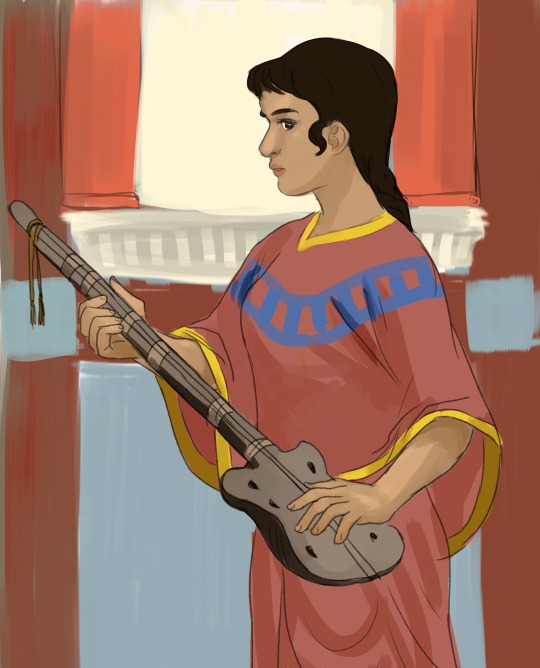
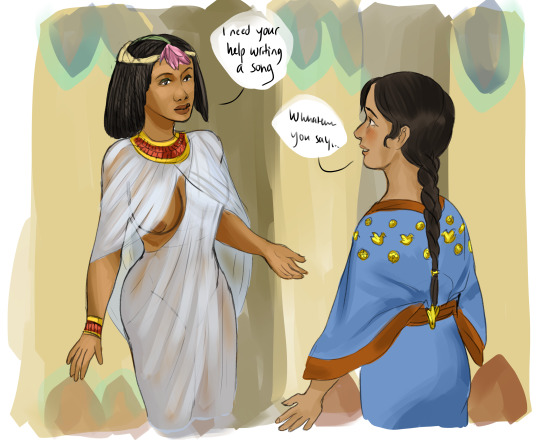
Me wanting to draw an Achaemenid noble woman living in Alexandria who's really into music and realized there are literally no resources for Achaemenid era Persian music 😭
Okay but her sister married this Macedonian cavalry guy at the wedding at Susa (this girl was just a little kid at this time) and in the time before that they had been hanging out in Susa in Parmenion's finishing school for newly orphaned noble women (that is what I choose to call it), which included all the singing girls in the choir and their music master that were captured outside Damascus.
So she was already a prodigy but the king's music master was also a crazy musical genius and they basically just genius'd together until he died from some disease. Anyway so the Macedonian cavalry guy ended up with Ptolemy during the "Funeral Games" so he, his wife and this girl moved to Alexandria. If I made this a comic, it would be based around 321 or 318, basically the other Diadochi are trying to invade Egypt, and there's drama because of course Ptolemy only trusts his Macedonian troops, but there's like lots of Greeks and Egyptians (duh) in Alexandria, and an Egyptian priestess sees this and she wants Ptolemy to win just because she knows any of the other diadochi will not be so respectful to her temple so she tries to set up like "unifying propaganda" and part of that is asking this girl to write a patriotic song to have people call themselves 'Alexandrians' instead of Macedonians, Rhodians, Cypriots, etc. And this girl says yes because it makes her feel important and also the priestess is really hot.
9 notes
·
View notes
Text
Oskhophoria
Oskhophoria is a festival held on the same day as Pyanepsia in honor to Dionysos and Athena Skira, those who protect the grape harvest. This was honored with a procession from a temple of Dionysos to the temple of Athena Skira at Phaleron.
Two boys dressed as women would carry bunches of grapes on their vines while the herald led the procession. There was a garland wrapped around his staff, as per the customs set by the legend of Theseus.
Theseus was supposed to let his father know he had returned home safely by raising white sails. In his excitement to return home, he forgot to do so and the father leapt to his death thinking he was dead.
The herald who went from the port to Athens was greeted with the king's death, where instead of placing the welcome home wreaths upon his head, he placed it upon his staff.
Celebrate with me during this harvest, let us honor Dionysos and thank him for his blessings upon the land.
Fumigation from Storax
Dionysos I call, loud-sounding and divine,
fanatic God, a two-fold shape is thine:
Thy various names and attributes I sing,
O, first-born, thrice begotten, Bacchic king:
Rural, ineffable, two-form'd, obscure,
two-horn'd, with ivy crown'd, euion, pure.
Bull-fac'd, and martial, bearer of the vine,
endu'd with counsel prudent [Eubouleos] and divine:
Triennial, whom the leaves of vines adorn,
of Zeus and Persephone, occultly born.
Immortal dæmon, hear my suppliant voice,
give me in blameless plenty to rejoice;
And listen gracious to my mystic pray'r,
surrounded with thy choir of nurses fair.
Orphic Hymn 29 to Dionysos, trans. Taylor
6 notes
·
View notes
Text
HSR LEAKS SUNDAY
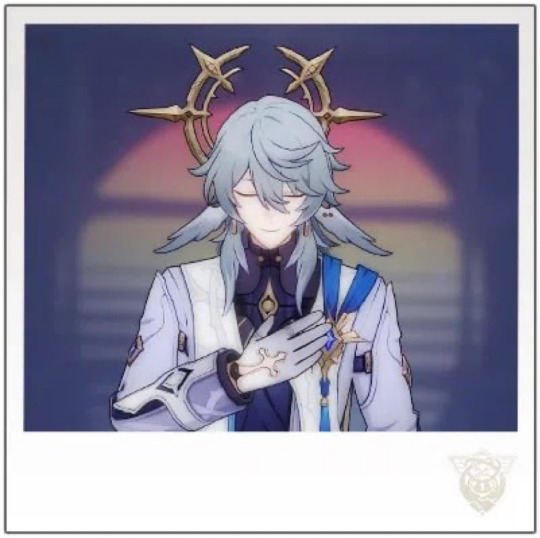
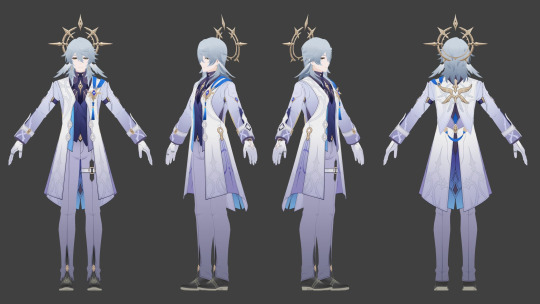

OKAY WE'RE SO BACKKK SO BACK OH MY GODDD
They put his old halo design as a pattern on the back of his coat :D
Also he now officially has 6 wings , 2 on his head and 4 on his back ;; I am so happy
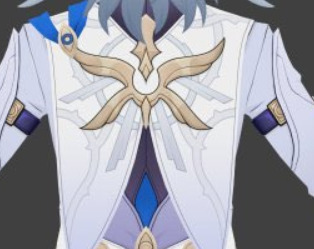
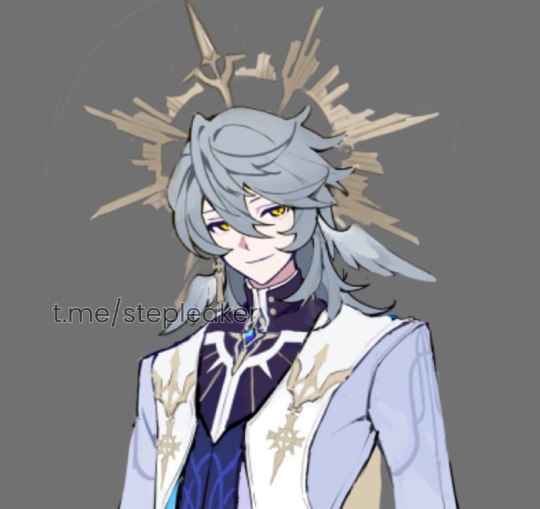
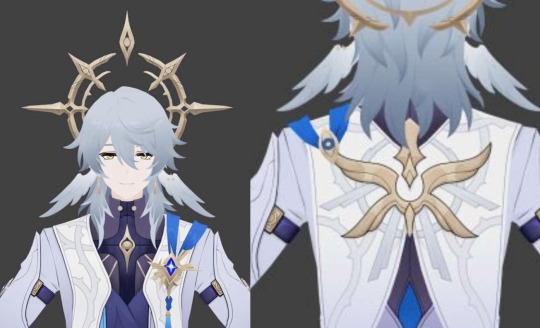

Also on his clothes he has 12 eyes + 2 of his actual eyes (There might also be eyes on his rings but I cannot tell due the quality of the picture sadly ;;
Once again I am Atheist, I get this knowledge from things I was taught but this may not be completely correct so feel free to correct me :)
When drawing biblically accurate angels they usually give them a lot of eyes. But, it isn't specifically mentioned for Seraphims:
Isaiah 6:1-8 MSG
In the year that King Uzziah died, I saw the Master sitting on a throne—high, exalted!—and the train of his robes filled the Temple. Angel-seraphs hovered above him, each with six wings. With two wings they covered their faces, with two their feet, and with two they flew. And they called back and forth one to the other, Holy, Holy, Holy is GOD-of-the-Angel-Armies. His bright glory fills the whole earth. The foundations trembled at the sound of the angel voices, and then the whole house filled with smoke. I said, “Doom! It’s Doomsday! I’m as good as dead! Every word I’ve ever spoken is tainted— blasphemous even! And the people I live with talk the same way, using words that corrupt and desecrate. And here I’ve looked God in the face! The King! GOD-of-the-Angel-Armies!” Then one of the angel-seraphs flew to me. He held a live coal that he had taken with tongs from the altar. He touched my mouth with the coal and said, “Look. This coal has touched your lips. Gone your guilt, your sins wiped out.” And then I heard the voice of the Master: “Whom shall I send? Who will go for us?” I spoke up, “I’ll go. Send me!”
I think, when people refer to the angel with a lot of eyes they refer to Ezekiel 1. Ezekiel 1 is the first chapter of the Book of Ezekiel in the Old Testament of the Bible. The Book of Ezekiel is a prophetic book, and it contains visions and prophecies from the prophet Ezekiel, who was a priest and a captive in Babylon. In here he described something called the Ophanim (AKA auphanim, ofanim or galgalim). The ophanim refer to the wheels seen in Ezekiel's vision of the chariot in Ezekiel 1:15-21. One of the Dead Sea scrolls construes them as angels but in the Book of Enoch they are a class of celestial beings who along with the Cherubim and Serpahim never sleep and guard the throne of God. In Christian angelology, they are one of the choirs of angels, and are also called Thrones (Wikipedia contributors, 2023).
These "wheels" have been associated with Daniel 7:9 (mentioned as galgal, traditionally "the wheels of galgallin", in "fiery flame" and "burning fire") of the four, eye-covered wheels (each composed of two nested wheels), that move next to the winged Cherubim, beneath the throne of God. The four wheels move with the Cherubim because the spirit of the Cherubim is in them. The late Second Book of Enoch (20:1, 21:1) also referred to them as the "many-eyed ones". - Wikipedia
Nowadays the many eyes also get put into many other designs that have anything celestial / angel-like which is honestly so cool :') I love it.
Sources:
Wikipedia contributors. (2023, 28 november). Ophanim. Wikipedia. https://en.wikipedia.org/wiki/Ophanim
3 notes
·
View notes
Text
Questionnaire Tag Game
Last song: Sunshine In My Soul Today by the Tabernacle Choir at Temple Squair
Currently watching: Return of the King (very, very slowly)
Currently reading: The Silmarillion (not fast enough it would seem)
Current favourites: The Feanorians et al. (including the best adopted twins ever, in the history of forever)
tagged by: @nighttimepatrons
tagging: @zannolin @bizzybee429 @eternal-vambraces
2 notes
·
View notes
Photo
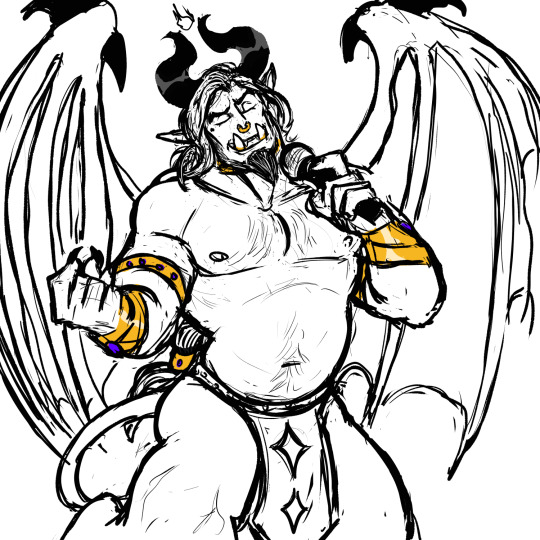
I'll stick with you, baby, for a thousand years. Nothins gonna touch you in these gooolden yeaaaaars - gooold~
---
Lounge night at your secret Temple of Darkness is fun when you sound like Jareth the Goblin King. Beats the holy choirs for a little while.
#orc#orcs#runebeast#still drawing this guy im sorry#It's kick started my inspiration and drawing#demon#art art
53 notes
·
View notes
Text
youtube
Sign of the Judgment - Rev. Isaac Douglas Presents… Benny Cummings and the Kings Temple Choir (In Times Like These, 1976)
#Soul#Soul Music#Soul Music Songs#Music#Music Songs#Benny Cummings and the Kings Temple Choir#1976#Gospel#Gospel Soul#Creed Records#Sign of the Judgment#Youtube
1 note
·
View note
Text
Saints&Reading: Wednesday, August 2, 2023
orthodox peace fellowship
august 2_july 20
THE HOLY PROPHET ELIAS/ELIJAH ( 9th. c B.C)

Saint Elijah, one who saw God, a miracle worker and a zealot for faith in God, was born of the tribe of Aaron from the town Tishba for which he was called the Tishbite. When St. Elijah was born, his father Savah saw an angel of God hovering around the child, wrapping the child in fire and giving him a flame to eat. That foreshadowed Elijah's fiery character and his God-given fiery power. He spent his entire youth in godly thoughts and prayers, withdrawing frequently into the wilderness to contemplate and to pray in solitude. At that time, the Jewish kingdom was divided into two unequal parts: the kingdom of Judah, consisting of only two tribes, the tribes of Judah and Benjamin, with their capital in Jerusalem, and the kingdom of Israel, consisting of the remaining ten tribes with their money in Samaria. The first kingdom was governed by the descendants of Solomon, and the second kingdom was ruled by the descendants of Jeroboam, the servants of Solomon. The most significant confrontation the prophet Elijah had was with the Israelite King Ahab and his evil wife, Jezebel. For they, Ahab and Jezebel worshipped idols and turned the people away from serving the One and Living God. Before this, Syrian Jezebel persuaded her husband to erect a temple to the Syrian god Baal and ordered many priests to serve this false god. Through great miracles, Elijah displayed the power and authority of God: he closed up the heavens so that there was not any rain for three years and six months; he lowered a fire from heaven and burned the sacrifice to his God, which the pagan priests of Baal were unable to do; he brought down rain from heaven by his prayer; miraculously multiplied flour and oil in the home of the widow in Zerepath, and resurrected her son; he prophesied to Ahab that the dogs will lick up his blood and to Jezebel that the dogs will consume her flesh, all of which happened as well as many other miracles did he perform and prophesy. On Mount Horeb, he spoke with God and heard the voice of God in the calm of a gentle breeze. Before his death, he took Elisha and designated him as his successor in the prophetic calling; by his mantle, he divided the waters of the Jordan River; finally, he was taken up into the heavens in a fiery chariot by flaming horses. He appeared on Mount Tabor to our Lord Jesus Christ together with Moses. Before the world's end, St. Elijah will appear again to end the anti-Christ's power (Revelation, Chapter 11).
ST. ALEXIS MEDVEDKOV, ARCHPRIEST OF UGINE (1934), ELIAS FONDAMINSKII (1942), PRIEST DEMETRIUS KLEPININE (1944), YURI SKOBTSOV (1944), AND NUN MARIA (SKOBTSOVA) (1945), OF PARIS
St Alexis Medvedkov, archpriest of Ugine (1934)
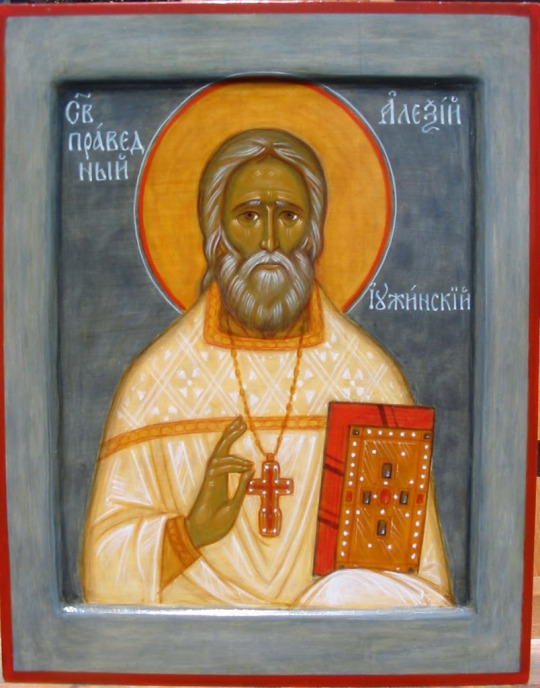
St Alexis of Ugine was born in Russia in 1867. Afterward, he went to seminary and became a reader and choir director at a St Petersburg parish. He felt unworthy of the priesthood but finally accepted ordination, encouraged by St John of Kronstadt. He was sent to serve a village 60 miles from the capital. As was the case for many priests, his meager salary was not enough. Side by side with his neighbors, he worked the land. Yet he also lived a life of mind and spirit, saving money to buy the writings of the Church Fathers. He was also a parent -- he and his wife had two daughters. His pastoral zeal was recognized -- in 1916, at age 49, he was made an archpriest. Then the following year, in the aftermath of the Bolshevik Revolution, he was arrested, tortured, and sentenced to death. Remarkably, his eldest daughter freed her father by offering herself as a hostage in his place. The effects of torture remained with him for the rest of his life. Because of nerve damage, his right eye was always wider than his left.
In 1919 the entire family managed to escape to Estonia, where Fr Alexis worked in a mine and then as a night watchman. In 1923 he became an assistant priest at a local parish, also helping in the parish school. In 1929, following prolonged illness, his wife died.
After this heavy blow, he was invited by Metropolitan Evlogy in Paris to come to France. He was sent to the town Ugine, near Grenoble, to serve as rector of St Nicholas Russian Orthodox church. A local factory employed 600 Russian immigrants.
He often celebrated the Liturgy on weekdays, Sundays, and feast days. He was known for how carefully he intoned each word when he stood in the sanctuary. After services, he would stay on to do memorial services and meet whatever other needs were brought to him by his parishioners, never charging money.
His congregation proved difficult. The parish council was dominated by secular-minded lay people of a military background, men used to giving orders, whose primary interest was politics. Some harassed Fr Alexis during services. Some were abusive. When insulted, he replied with silence. He patiently endured the criticism of those who regarded the services as too long or criticized him for not dressing better.
His health declined -- doctors diagnosed cancer of the intestines. In July 1934, he was taken to hospital. He died on the 22nd of August. On the advice of a physician who warned that Fr Alexis' cancer-ridden body would rapidly decompose, he was buried in a double coffin.
His parishioners, even those who had been hostile, came to remember him as an exceptionally modest man, shy, full of gratitude, prayerful, outgoing, compassionate, slow to criticize, eager to forgive, generous with what little he had, who never turned his back on anyone in need.
A friend who visited him during those final weeks of his life recalled him saying: "In my parish, the true parishioners are the children, the children of my parishioners ... and if those children live and grow up, they will form the inner Church. And we, too, belong to that Church as long as we live according to our conscience and fulfill the commandments ... Do you understand what I mean? In the visible Church, there is an invisible Church, a secret Church. In it are found the humble who live by grace and walk in the will of God. They can be found in every parish and every jurisdiction. The emigration lives through them and by the grace of God."
It was a life of ordinary sanctity -- small deeds of holiness performed daily that were either taken for granted or ridiculed. He might have been entirely forgotten had it not been for a decision by the Ugine town council in 1953 to build flats on the site of the cemetery. The remains of those buried in the old cemetery were moved. On the 22nd of August, 1956, precisely 22 years after Fr Alexis's death, workmen came to his grave and found that his double coffin had entirely disintegrated. Still, his body, priestly vestments, and the Gospel book buried with him had not decayed.
I have left out many details of his life. Still, you see the main lines: great suffering, endurance, patient service to impatient people, belief in the face of disbelief, an uprooted life, the early death of his wife, his own brutal death, a love of prayer, a constant witness to God's love -- and then a sign after death that served to resurrect his memory and inspired the decision that this humble priest ought to be remembered by the Church. The memory of the Church is the calendar of the saints.
St Eli Fondemensky of Paris ( 1942)

Born in February 17, 1880, in Moscow, Russia — November 19, 1942, in Auschwitz, Nazi-occupied Poland),
He was a Russian author (writing under the pseudonym I. Bunakov) and political activist in the 1910s, one of the leaders of the Esers party, in 1917, a senior member of Alexander Kerensky's Provisional government
In 1918, Fondaminsky took part in the Iași Conference. In Paris, where he has been living since 1919, Fondaminsky veered off from the left and became an influential newspaper editor (Sovremennye Zapisky, among others), author of philosophical essays, and in the later years — much-admired philanthropist, supporting Christian magazines and charity funds. In his biography of Mother Maria Skobtsova, Pearl of Great Price, Father Serge Hackel wrote that Fondaminsky gave occasional lectures at the Sunday afternoon gatherings at the house on the Rue de Lourmel.
Facing the Nazi occupation, Fondaminsky refused to leave Paris, saying he would accept his destiny, whatever it would be. Arrested in July 1941 as a Jew and sent to the concentration camp, he adopted Christianity and was received into the Russian Orthodox Church not long before being sent to Auschwitz. Ilya Fondaminsky died there on November 19, 1942, aged 62.
Priest Dimitry Klepinine (1944)
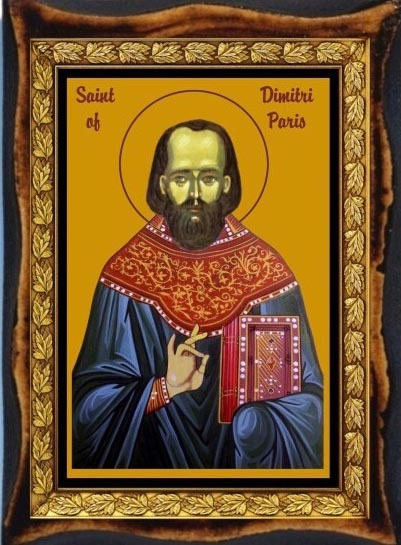
Father Dimitri Klepinin was born in 1904 in Russia to an educated, cultivated, devout Orthodox family. His mother, Sophia, helped establish Orthodox schools in Odessa, where they lived, and became active in providing help and support to the city’s poor. The Klepinin family fled Russia after the Communist Revolution, first residing in Constantinople, then Yugoslavia, and finally in Paris, France. A turning point in Dimitri’s life occurred in 1923 when his beloved mother died. He described this experience in a letter to a friend:
“…the first time I understood the significance of suffering…But joy returned to me when I remembered the Savior’s words: ‘Come to Me, all who labor and are heavily laden, and I will give you rest. Take my yoke upon you and learn from Me; for I am gentle and lowly in heart, and you will find rest for your souls. For my yoke is easy, and my burden is light. I had come to my mother’s grave with the heavy burden of worldly worries. Everything seemed confused and unsolvable when suddenly I found the light yoke of Christ. I’ve never known a day more joyful than that day, and I thank God for all He’s given me to bear. After that experience, I reoriented my life, and it became easier to resolve certain problems."
In 1925, Dimitri enrolled in the St. Sergius Theological Institute in Paris, and after graduating in 1929, he received a scholarship to study in America at the New York Protestant Theological Seminary. Returning to Paris, he worked various jobs while remaining active in the Church, directing the parish choir. Dimitri married Tamara Baimakova in 1937 and was ordained by Metropolitan Evlogy. A daughter Helen was born in 1939, and a son Paul in 1942. Father Dimitri’s life was forever changed in 1939. He was assigned as the parish priest at the shelter for the poor operated by an Orthodox nun, Mother Maria Skobtsova. Significantly for his life and that of Mother Maria, that same year France was invaded and conquered by the German Nazis. Mother Maria (now St. Maria of Paris) had opened a home and shelter to minister to the poor of Paris. As the Nazis began the mass arrests of French Jews in 1942, many sought help and refuge at Mother Maria’s shelter. As a shield against deportation to a concentration camp, many Jews sought to obtain baptismal certificates from Father Dimitri. While initially troubled by engaging in such deception, he realized his Christian Faith and priesthood demanded that he act. He placed a small mark on the false certificates to remember which were authentic and which were not.
Christ would give me that paper if I were in their place. So I must do it… …If a man surprised by a storm takes shelter in a church, do I have the right to close the door?
During war, suffering, and mass arrests, one of Father Dimitri’s parishioners wrote of the experience of celebrating Pascha with him in 1942. It was to be his final Pascha at his parish:
Outside there were restrictions, anguish, and war. Here in the church, lit up by our candles, was our priest, all vested in white, as if borne on the wings of the winds. With his face radiant, he proclaimed, “Christ is risen!”. And we responded, “Truly He is risen!” causing the shadows to scatter.
In February, 1943, the Gestapo arrived at Mother Maria’s shelter and arrested Mother Maria, her son Yuri and several others. In Yuri’s pocket, they discovered a letter from a Jewish family to Father Dimitri requesting a baptismal certificate. Father Dmitri was absent during the raid, but the following day, he calmly celebrated a final Divine Liturgy in the church and went to face the Gestapo.
Two months later, Father Dimitri and Mother Maria's son Yuri were sent to a prison camp. In the camp, Father Dimitri continued to function as a priest. The Orthodox prisoners were permitted to set up a chapel where the Divine Liturgy was served daily. Father Dimitri could sketch the chapel, which he smuggled out to his wife. In letters he wrote to his family, he encouraged his wife to remain strong:
Make the morose thoughts go away with the Jesus Prayer, take Communion as often as possible…Don’t let despondency or irritation take root in you, and dash and confess to a priest.
Of his own life he wrote:
I am fully aware that the will of God is being carried out and that a new obedience in the Church is beginning for me.
After a year, Father Dimitri was sent to the Buchenwald concentration camp in Germany and then to the camp at Dora. His health was broken; suffering from pneumonia, he died on February 9, 1944, and his body was burned in the Buchenwald crematorium. When word reached his family that Father Dmitri had died, Metropolitan Evlogy officiated at a solemn funeral service in the Paris Cathedral. On January 16, 2004, Father Dimitri, Mother Maria, her son Yuri and associate Elia Fondaminski were all glorified as martyrs/saints of the Orthodox Church by the Ecumenical Patriarchate of Constantinople. Their memory is kept each year on their feast day of July 20
Saint Marie of Paris (1945)

Mother Maria was born in Latvia in 1891. Like many of the pre-Revolutionary Russian intelligenstia, she was an atheist and a political radical in her youth but gradually came to accept the truths of the Faith. After the Revolution, she became part of Paris's large Russian emigre population. There she was tonsured as a nun by Metropolitan Evlogy, and devoted herself to a life of service to the poor. With a small community of fellow believers, she established 'houses of hospitality' for the poor, the homeless, the alcoholic and visited Russian emigres in mental hospitals. In 1939 Metropolitan Evlogy sent the young priest Fr Dimitry to serve Mother Maria's community; he proved to be a partner, committed even unto death, in the community's work among the poor. When the Nazis took Paris in 1940, Mother Maria, Fr Dimitry, and others of the community chose to remain in the city to care for those who had come to count on them. As Nazi persecution of Jews in France increased, the Orthodox community's work naturally expanded to include protection and care of these most helpless ones. Father Dimitri was asked to provide forged certificates of baptism to preserve the lives of Jews and always complied. Eventually, this work led to the arrest of Mother Maria, Fr Dimitri, and their associates. A fragment survives of the Gestapo's interrogation of Fr Dimitri:
Hoffman: If we release you, will you give your word never again to aid Jews?
Klepinin: I can say no such thing. I am a Christian and must act as I must. (Hoffman struck Klepinin across the face.)
Hoffman: Jew lover! How dare you talk of helping those swine as being a Christian duty! (Klepinin, recovering his balance, held up the cross from his cassock.)
Klepinin: Do you know this Jew? (For this, Father Dimitri was knocked to the floor.)
"Your priest did himself in," Hoffman said afterward to Sophia Pilenko. "He insists that if he were to be freed, he would act exactly as before."
Mother Maria, Fr Dimitri, and several of their colleagues were sent to the Nazi concentration camps (Mother Maria to Ravensbruck, Fr Dimitri to Buchenwald) where, after great suffering, they perished. It is believed that Mother Maria's last act was to take the place of a Jew being sent to death, voluntarily dying in his place.


JAMES 5:10-20
10 My brethren, take the prophets, who spoke in the name of the Lord, as an example of suffering and patience. 11 Indeed, we count them blessed who endure. You have heard of the perseverance of Job and seen the end intended by the Lord-that the Lord is very compassionate and merciful. 12 But above all, my brethren, do not swear, either by heaven or by earth or with any other oath. But let your "Yes" be "Yes," and your "No," "No," lest you fall into judgment. 13 Is anyone among you suffering? Let him pray. Is anyone cheerful? Let him sing psalms. 14 Is anyone among you sick? Let him call for the church's elders, and let them pray over him, anointing him with oil in the name of the Lord. 15 The prayer of faith will save the sick, and the Lord will raise him. And if he has committed sins, he will be forgiven. 16 Confess your trespasses to one another, and pray that you may be healed. The effective, fervent prayer of a righteous man avails much. 17 Elijah was a man with a nature like ours, and he prayed earnestly that it would not rain, and it did not rain on the land for three years and six months. 18 He prayed again, and the heaven gave rain, and the earth produced its fruit. 19 Brethren, if anyone among you wanders from the truth and someone turns him back, 20 let him know that he who turns a sinner from the error of his way will save a soul from death and cover many sins.
LUKE 4:22-30
22 So all bore witness to Him and marveled at the gracious words which proceeded out of His mouth. And they said, "Is this not Joseph's son?" 23 He told them, "You will surely say this proverb to Me, 'Physician, heal yourself! Whatever we have heard in Capernaum, do also here in Your country.' " 24 Then He said, "Assuredly, I say to you, no prophet is accepted in his own country. 25 But I tell you truly, many widows were in Israel in the days of Elijah when the heaven was shut up three years and six months, and there was a great famine throughout all the land; 26 but to none of them was Elijah sent except to Zarephath, in the region of Sidon, to a woman who was a widow. 27 And many lepers were in Israel during Elisha the prophet's time, and none of them was cleansed except Naaman the Syrian. 28 So all those in the synagogue, when they heard these things, were filled with wrath, 29 and rose up and thrust Him out of the city; and they led Him to the brow of the hill on which their city was built, that they might throw Him down over the cliff. 30 Then, passing through the midst of them, He went His way.
#ortthodoxy#orthodoxchristianity#easternorthodoxchurch#originofchristianity#spirituality#holyscriptures#bible#gospel#saints#russiansaints#paris
2 notes
·
View notes
Text

@jinzhide sent a letter : " don't you have somewhere to be , captain ? " for bei...

beidou finds her mind adrift at sea, the wide expanse of ocean that houses wonders and creatures alike , forever racing towards that bright north star in the sky. it is her namesake, perhaps a fate bestowed upon her by her parents by birth and while she seeks journeys beyond the scope of liyue, her heart remains in the docks. and so to the harbor city she returns, the crux filled with foreign gems curated especially for the tianquan. the court's workers and millelith are all too familiar with the captain's requests: it's always the same when she asks for ningguang's whereabouts.
and so there beidou sits before the grand mahogany desk at the center of the office. the dragon king's posture is all too comfortable for a guest of the jade palace, heels propped upon its otherwise pristine surface; at the sound of this grand temple's rightful owner, beidou remains seated though her head tilts backwards to meet her eye. heavy and firm, she leers at her with a wide smile, carved like the moon upon midnight's clear waters.

" i'm meant to be here, my dear. i thought i asked ganyu to work me into your schedule whenever i was meant to dock back at liyue? " ━━━ hands reach for her, a conductor reaching for her choir, extended until ningguang approaches. calloused fingers take her hand and as rugged a beast the captain may be, her touch is always gentle when she holds ningguang. jagged corners and sharp gazes all soften in her presence, a tender blanket falling around her shoulders that dampens any of her prickly dispositions. beidou smiles sweetly like her, batting her eye innocently.
" besides, i brought you gifts. aren't you curious about what we've curated for you? "
1 note
·
View note
Text
Devotional Hours Within the Bible

by J.R. Miller
Isaiah's Call to Service
(Isaiah 6:1-13)
Isaiah knew the very day and hour when he saw this wonderful vision. It was in the year that king Uzziah died. The vision had made such an impression on his mind that he never could forget it. It had meant so much to him as an experience, that he could never cease to look back to the day as his spiritual birthday.
That was a memorable year. Uzziah was one of the greatest of Judah’s kings. He had reigned fifty years with high honor, and then suddenly he was smitten with leprosy. He had gone into the temple and attempted with his own hands to burn incense. On his forehead appeared at once the white spot which was the mark of divine judgment, and the king was thrust out and dwelt in a leper house until his death. The year in which king Uzziah died, was therefore more than a date. That was the year of Isaiah’s vision .
There are one or two dates in nearly every earnest life, which are always remembered. Sometimes it is a loss or a sorrow which has made its indelible record. Sometimes it is the coming of a great joy into the heart the first meeting with a new friend, for example. Sometimes it is the day when Christ was revealed too the heart. We may be very sure that Andrew and John never forgot the day when they first saw Jesus and when He took them to His own lodgings for a long talk. It is good for us to keep records of the great days in our life.
The prophet in his vision, saw the Lord sitting upon a throne, high and lifted up. It is a great thing when such a vision as this fills one’s life. Too often it is this world which most largely blocks the soul’s view. Men see visions of wealth, power, fame, or pleasure but see not a gleam of heaven nor a hint of the shining of God’s face. But earthly visions do not exalt our life. They make us no better. When we have visions like Isaiah’s, in which God fills all our field of view we are lifted up in spirit, in character, in hope and joy. One who sees God is never the same man afterwards. He is set apart now for holy life and service. He is dominated ever after by a new influence. He has seen God he must therefore be holy; he must walk softly and reverently; he must be true to God.
There is something unusual and very impressive in the description of the seraphim in this vision. “Each one had six wings!” Wings are for flight it is the mission of angelic beings to fly on God’s errands. The six wings would seem to signify special readiness to do God’s will. But they suggest here, more than their normal use to fly.
The modern Christian would probably use them all for flying and would be intensely active. We live in an age when everything inspires to activity. We are apt to run, perhaps too greatly, with our ‘wings’.
But we should notice that two of the seraphim’s wings were used in covering his face when before God teaching reverence. Two of them also were used in covering his feet humility. The other two were used in flying activity. Reverence and humility are quite as important qualities in God’s service as activity!
The song of the seraphim, as they veiled their faces and covered their feet, indicated praise, worship. One choir sang, “Holy, holy, holy, is Almighty Jehovah!” and the other responded, “The whole earth is full of His glory!” What we owe to God always is holiness, for everywhere is His glory. Yet many people never see any of God’s glory in the earth. They think of glory as something bright and dazzling, like the burning bush, the pillar of fire, or the transfiguration. But there is as much glory in a tree laden with sweet blossoms as there was in the flaming bush at Horeb; and as much glory in a face shining brightly with love as there was in Stephen’s. We read of Christ’s first miracle that He thus “manifested His glory.” It was the glory of kindness and helpfulness which this miracle showed. Everywhere God’s glory shines in all nature and in all true Christian living, in lowly homes where prayer is offered.
The prophet stood now face to face with God, and the effect on him was a sense of his own sinfulness. “Then said I: Woe is me I for I am undone! Because I am a man of unclean lips, and I dwell in the midst of a people of unclean lips! For my eyes have seen the King, Almighty Jehovah!” We do not know our own unworthiness until we have had a glimpse of God. In the light of the divine holiness we see our own unholiness!
One of the most remarkable incidents in the Gospels, is that in which Peter begged Jesus to depart from him. It was after a great miracle. Peter was awed by the manifestations of power in Jesus. Only a divine being could do such work. The effect on him was that he shrank away from the presence of such a holy being! He was not worthy to stand before Christ. “Depart from me for I am a sinful man, O Lord!” When the light of God’s face shines into our heart we see how unworthy we are. All pride and self-conceit vanish when we stand in the presence of the divine glory.
The mercy of God is ever instant in its response to human penitence and confession. “Then one of the seraphim flew unto me, having a live coal in his hand, which he had taken with the tongs from off the altar; and he touched my mouth with it, and said: Lo, this has touched your lips; and your iniquity is taken away, and your sin forgiven!” The act of bringing the coal and touching the prophet’s lips, was very suggestive. The altar was the place of sacrifice. It was holy fire that burned there. All this must be kept in mind as we think of the meaning of this act. Not any common coal of fire would have done. It represented fire from heaven, the fire of the Holy Spirit. As the coal touched the lips of the prophet they were made pure and clean.
No sooner had the prophet’s lips been cleansed than the call for service came. “Whom shall I send, and who will go for us?” God is always wanting errand - runners. Angels fly swiftly and eagerly. There is not an angel in glory, who would not gladly come to earth on any mission, however lowly.
A legend tells of one of the highest angels sent to earth one day with two commissions to deliver a king from the power of some temptation; and to help a little struggling ant home with its burden of food. The latter errand was done just as dutifully and joyously by the great angel as the former. But God wants men as well as angels for messengers in this world. He is always asking this question, “Whom shall I send, and who will go for us?”
3 notes
·
View notes
Text



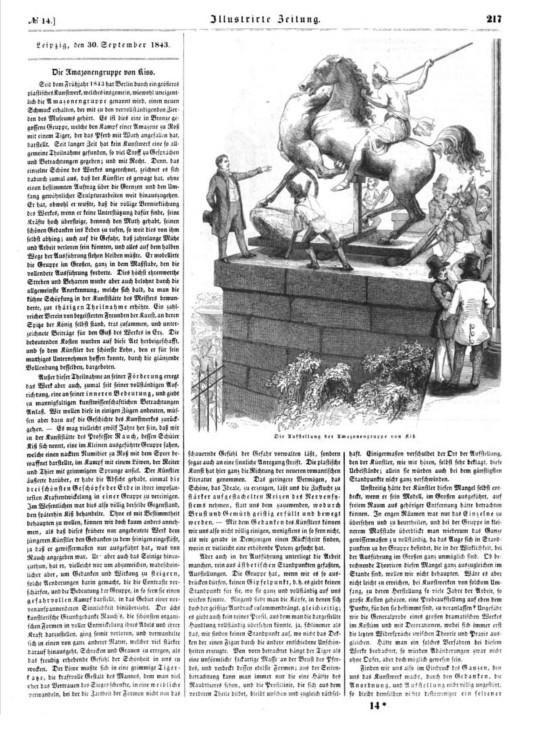

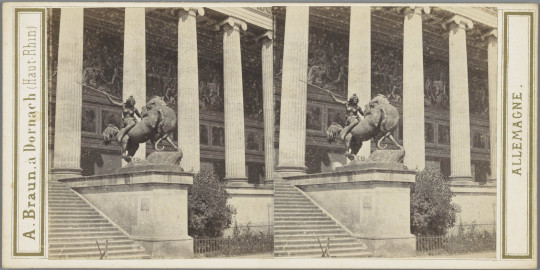
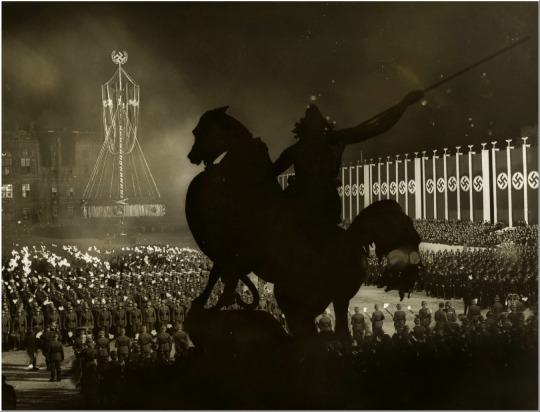

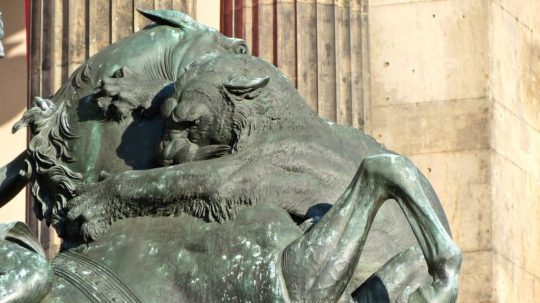
Amazon attacked by Panther by August Kiss 1841. Altes Museum.
"For thee [Artemis], too, the Amazons, whose mind is set on war, in Ephesos (Ephesus) beside the sea established an image beneath an oak trunk, and Hippo performed a holy rite for thee, and they themselves, O Oupis (Opis) Queen, around the image danced a war-dance--first in shields and armour, and again in a circle arraying a spacious choir. And the loud pipes thereto piped shrill accompaniment, that they might foot the dance together--for not yet did they pierce the bones of the fawn [i.e. to make flutes] . . . And the echo reached unto Sardis and to the Berekynthian range. And they with their feet beat loudly and therewith their quivers rattled. And afterwards around that image was raised a shrine of broad foundations [i.e. the Ephesian shrine]. That it shall dawn behold nothing more divine, naught richer. Easily would it outdo Pytho [Delphoi]."
-Callimachus, Hymn 3 to Artemis 240 ff (trans. Mair) (Greek poet C3rd BCE)
...
"Karl Friedrich Schinkel, the designer of the museum originally wanted to place here the equestrian statues of the two Prussian kings donating the museum, Frederick William III and IV. In fact, the museum, built between 1823 and 1830 as Königliches Museum, housed the royal private collections, and aimed at sharing their antique heritage with the educated bourgeoisie. However, Frederick William IV did not want royal statues here. Nevertheless, the idea was already on its way, and the stair railings cried out after equestrian statues.
The first equestrian statue, the Amazon killing a tiger or simply Amazon by the Silesia-born but Berlin-educated sculptor August Kiss was placed on the right rail in 1843. The September 30 issue of Illustrirte Zeitung reported in detail about its set-up and also provided art criticism. According to the author monogrammed L. R., the greatest merit of the work is that it was cast from public donation. The artist “was bold enough” to model the sculpture in life size in his studio, and only later a “large association of enthusiastic friends of art, led by the King” (of which Schinkel was also a member) collected the sum necessary to casting. This is, then, the first – albeit not visible – link between the museum and the sculpture: the active participation – “sacrifice” – of the educated burgeoisie in the enrichment of the new center of bourgeois culture – or, in the vocabulary and conception, its “temple”.
The prolific critic Karl August Varnhagen also praises the sculpture for this reason: “It is a great, bold, expressive and powerful work. … One can see that the horse is already lost, but the person is triumphing. The beautiful amazon radiating with spiritual superiority will survive, and will at least take revenge for the horse.” This concern for a secondary figure is unusual from a critic, but we know that Varnhagen fought the Napoleonic wars under Austrian, Prussian and Russian flags, and was able to exactly gauge what it means to lose a horse in an emergency. However, no one is yet concerned for the tiger at this time.
The Fairmount Park Art Association (now the Association for Public Art) acquired the plaster casts for both works in 1889, but the Amazon cast was in such poor condition that it could not be shipped to the United States.
With the assistance of the German government, a new plaster cast was made from the original bronze and exhibited in Memorial Hall until 1909. The decision to commission only American art prompted the Association to present the Amazon as a gift to Harvard’s Germanic Museum. However, once construction began on the new building for the Philadelphia Museum of Art, the Association arranged to cast another copy so that it could sit across from The Lion Fighter."
-taken from associationforpublicart and riowang's blogspot
#amazons#european art#german art#sculpture#history#literature#19th century art#august kiss#museums#altes museum#swastika#philadelphia museum of art
8 notes
·
View notes